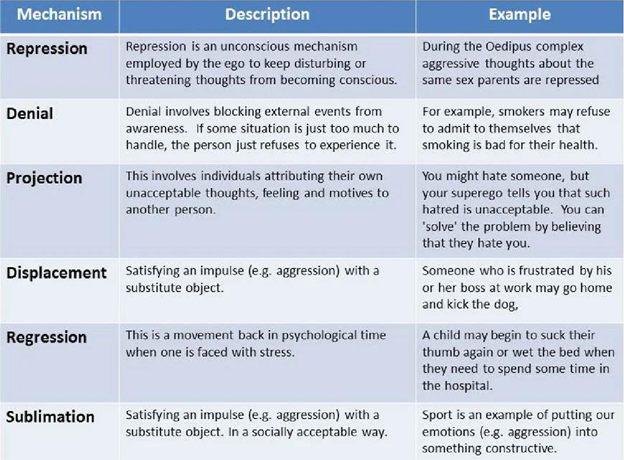A nurse is caring for a client who has bipolar disorder. The client yells at the nurse whenevermedication changes are prescribed by the client's provider.
The nurse should identify that theclient is using which of the following defense mechanisms?
Conversion
Splitting
Displacement
Sublimation
The Correct Answer is C
Explanation:
Displacement is a defense mechanism in which an individual redirect their emotions or impulses from their original target to a less threatening or safer target. In this scenario, the client yells at the nurse when medication changes are prescribed by the provider. The client may be feeling angry or frustrated about the medication changes but is unable to express those emotions directly towards the provider. Instead, the client displaces those feelings onto the nurse, who may be seen as a safer or more accessible target. The yelling behavior directed at the nurse is a way for the client to release and express their emotions indirectly.
Let's briefly discuss the other defense mechanisms mentioned:
A- Conversion: Conversion involves the expression of psychological distress or conflict through physical symptoms or ailments. It is not applicable in this scenario since the client's behavior does not involve physical symptoms.
B- Splitting: Splitting is a defense mechanism characterized by a black-and-white thinking pattern, where individuals perceive others or situations as all good or all bad. It does not directly apply in this scenario as the client's behavior is not indicative of splitting.
D- Sublimation: Sublimation is a defense mechanism in which an individual channel their unacceptable or potentially harmful impulses into socially acceptable outlets, such as creative or productive activities. It is not evident in this scenario as the client's behavior does not involve transforming the emotions into a more positive or socially acceptable form.

Nursing Test Bank
Naxlex Comprehensive Predictor Exams
Related Questions
Correct Answer is C
Explanation
Elevating the head of the bed while sleeping is a recommended strategy for managing GERD (gastroesophageal reflux disease). By raising the head of the bed, gravity helps to prevent stomach acid from flowing back into the esophagus, reducing the likelihood of acid reflux and associated symptoms.
"You should eat three large meals and two snacks per day" is not recommended for GERD management. Instead, it is advised to have smaller, more frequent meals throughout the day to reduce the pressure on the stomach and minimize the likelihood of acid reflux.
"You should lay down for 1 hour following a meal" is not recommended for GERD management. It is advised to avoid lying down immediately after meals, as this can increase the risk of acid reflux. It is generally recommended to wait at least 2 to 3 hours before lying down.
"You should only drink 2 cups of coffee per day" is a specific recommendation related to caffeine intake, which can potentially trigger or worsen GERD symptoms in some individuals. However, this statement alone does not encompass the comprehensive dietary recommendations for managing GERD.
Correct Answer is C
Explanation
Wearing a medical identification wristband is important for children with chronic conditions such as cystic fibrosis. It helps alert others, including healthcare providers, about the child's condition in case of emergencies. The wristband can provide vital information about the child's diagnosis, treatment needs, and emergency contacts, ensuring appropriate care and timely interventions.
The other options mentioned are not appropriate or necessary for the care of a child with cystic fibrosis:
A- It is important to involve the child to an age-appropriate extent in decision-making about their treatment. Encouraging the child to participate in their own care and treatment decisions can promote their independence and self-management skills.
B- The influenza vaccine is generally recommended for children with cystic fibrosis, as they are at increased risk of respiratory infections. The vaccine helps protect against influenza and its potential complications. Therefore, the nurse should emphasize the importance of annual influenza vaccination for the child.
D- Homeschooling may not be necessary solely based on the diagnosis of cystic fibrosis. The decision regarding the child's education should be made based on their individual needs, abilities, and preferences, in consultation with the child's healthcare team and educational professionals.
Whether you are a student looking to ace your exams or a practicing nurse seeking to enhance your expertise , our nursing education contents will empower you with the confidence and competence to make a difference in the lives of patients and become a respected leader in the healthcare field.
Visit Naxlex, invest in your future and unlock endless possibilities with our unparalleled nursing education contents today
Report Wrong Answer on the Current Question
Do you disagree with the answer? If yes, what is your expected answer? Explain.
Kindly be descriptive with the issue you are facing.
